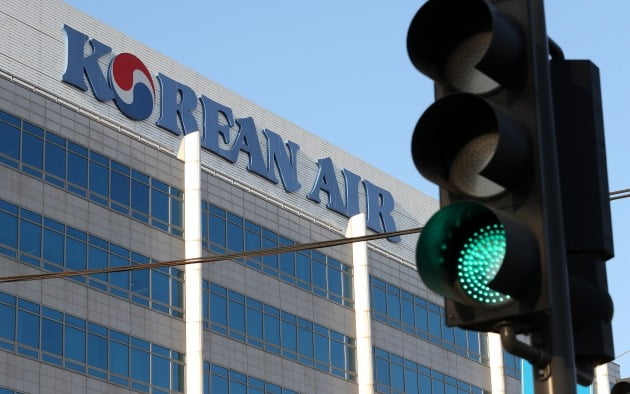
Photo = News 1
Korean Air has raised the plate for a paid-in capital increase that is promoted to acquire Asiana Airlines. Although the stock price jumped by nearly 30% from November of last year, when the first announcement was made, it has decided to maintain the planned number of new shares issued. Accordingly, the amount of financing through the capital increase increased by 800 billion won from 2.5 trillion won to 3.30 trillion won.
Korean Air expands capital increase to 3.30 trillion won

Photo = News 1
Korean Air announced on the 22nd that it has increased the amount of paid-in capital increase scheduled to be implemented in March from 2.5 trillion won to 3.30 trillion won.
Korean Air is set to allocate new shares for a paid-in capital increase on the 26th to raise funds for the acquisition of Asiana Airlines. Korean Air has decided to keep the issuance of new shares at 173.6 million, even though the stock price has risen. New shares allocated per share are 0.79 shares.
Initially, Korean Air announced on November 16 that it plans to raise funds worth 2.5 trillion won through a paid-in capital increase. Of the funds raised, 1.5 trillion won was invested in the acquisition of Asiana Airlines, and the remaining 1 trillion won was used as debt repayment funds.
In the meantime, despite the share price rise, Korean Air is expected to acquire an additional KRW 800 billion in funding from the original plan while maintaining the scale of issuing new shares. The planned issue price of new shares jumped from 14,400 won per week to 19,100 won. The stock price, which was 26950 won at the time of disclosure in November of last year, has closed at 34,950 won on the same day. Korean Air will invest additional funds from the increase in the size of the bequest to repay its debts.
In general, a paid-in capital increase is accepted in the stock market as a factor that dilutes shareholder value, but Korean Air’s share price has recently risen due to expectations for the consolidation of national airlines. The scheduled subscription date for the employee stock ownership association and the old shareholders is March 4, and the new stock listing is on March 24.
FTC judges monopoly as’the last gateway’… Quick screening with a dedicated team

Photo = Yonhap News
As such, Korean Air’s acquisition of Asiana Airlines, which has crossed the ninth ridge, has reached the stage of the Fair Trade Commission’s business combination review, which is the’last gateway’. With Korean Air insisting on the acquisition of’aviation industry integration’ in the midst of a new coronavirus infection (Corona 19) crisis, the judgment of the FTC is expected to be a last-minute variable.
On the 14th, Korean Air reported a business combination to foreign competition authorities such as the FTC. Korean Air is focusing on the fact that the passenger slot market share of both companies at Incheon Airport is 38.5%, which is less than 50%, which is the standard for monopoly. However, the FTC is expected to look at places with a market share of 50% or more by route and determine the possibility of monopoly.
Some point out that when Korean Air and Asiana Airlines merge, there are a total of 32 international routes with more than 50% of the two companies’ operating market share, which may cause consumer damage. According to Park Sang-hyuk and the Democratic Party’s office, there were 32 routes (22.4%) with a market share of more than 50% after the two companies merged. Where the combined market share of both companies exceeds 50%, it accounts for one-tenth (9.9%) of all international routes.
In particular, 7 routes from Incheon to New York, Chicago, Los Angeles (LA) and Barcelona accounted for 100%. From Incheon to Honolulu, Rome, Phuket and Delhi also surpassed 75%.
In this situation, the FTC established a team dedicated to Korean Air’s acquisition of Asiana Airlines and initiated the review.
The Fair Trade Commission announced that in 2021’s main business promotion plan announced today, “We will quickly and effectively screen large-scale mergers and acquisitions (M&As) in the fields of aviation, shipbuilding and machinery, which are expected to be restructured due to rapid industrial restructuring and global economic downturn. Told.
Reporter Oh Jung-min Hankyung.com [email protected]
Article reports and press releases [email protected]
